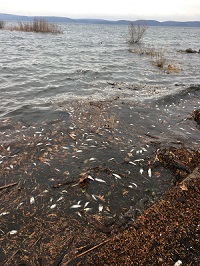
Large numbers of small fish called alewives are washing up on the shores of Lake Champlain in Milton and Georgia. State fisheries biologists from the Vermont Fish & Wildlife Department say it is an example of the kind of problems non-native invasive fish species can cause.
First documented in Lake Champlain in 2005, alewives are now well established and found throughout the lake.
"Unfortunately, dead alewives washing up on the shores of Lake Champlain following a winter die-off has become a common occurrence," said State Fisheries Biologist Shawn Good. “Alewives are an invasive fish species native to the Atlantic Ocean, and they are not well adapted to winters in freshwater lakes such as Lake Champlain. They are highly susceptible to fluctuations in water temperature that occur in the winter and are easily killed when this happens."
Good says dead alewives tend to stay preserved for long periods of time in cold water, but as ice cover melts in the spring, they wash up on shore in large numbers.
"Invasive fish species like alewives can have many negative repercussions to our native fish communities, as well as impacting the general public when large die-offs occur like we’re seeing again this spring,” said Good. “The movement and introduction of fish from one water to another, whether accidental or purposeful, is illegal and can threaten Vermont’s aquatic ecosystems and the fishing opportunities they provide.
Good says while some anglers may think introducing a new fish species to their favorite lake or pond will provide a new fishing opportunity or provide food for game fish already inhabiting the waterbody, the reality is that non-native fish introductions almost always have unwanted, negative consequences.
"The great fishing we enjoy today could be gone tomorrow if aquatic nuisance fish species are allowed to spread," he cautioned. “We all need to work together to slow or prevent the spread of exotic species and protect Vermont’s native fish and the fishing opportunities they provide.”
For Immediate Release: April 16, 2019
Media Contacts: Shawn Good, 802-786-3863; Bernie Pientka 802-879-5698
